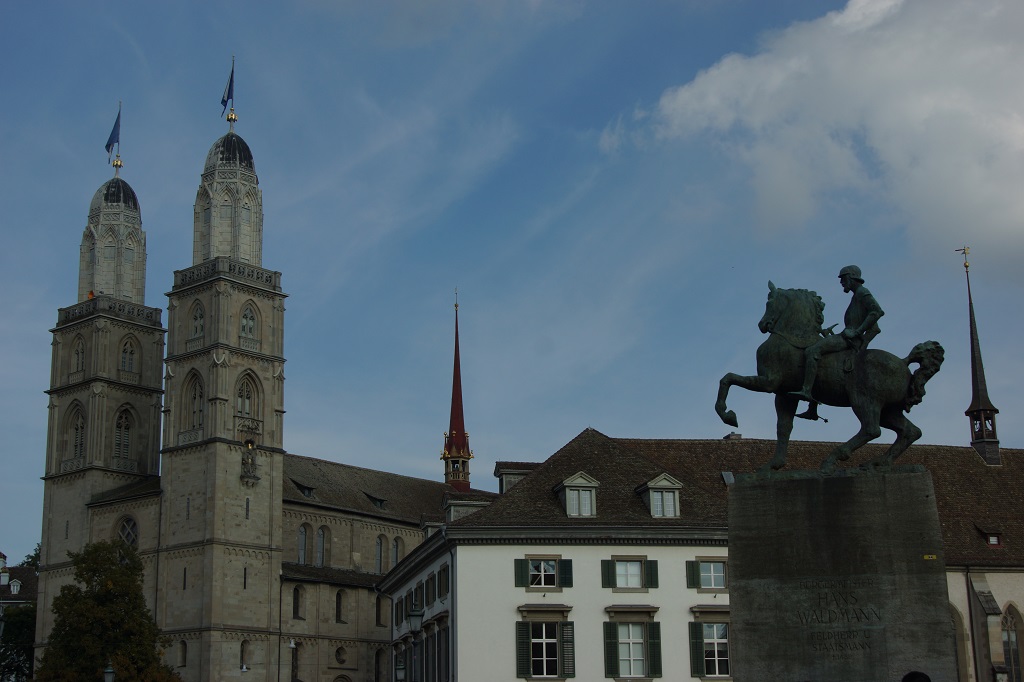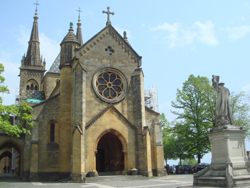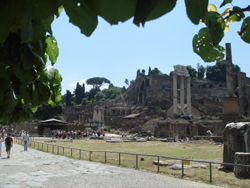-
 Einsiedeln -
According to legend, Saint Meinrad established a hermitage
on Mount Etzel and established a shrine to the Virgin
Mary which housed a statue of the Virgin. After his death
in 861 at the hands to two robbers, others sought to
emulate his example and work on the monastry began in
934. Now the Baroque Benedictine Monastry boasts a 150
meter façade and an ornate interior. It is one
of the major points of pilgramage in central Europe.
Einsiedeln -
According to legend, Saint Meinrad established a hermitage
on Mount Etzel and established a shrine to the Virgin
Mary which housed a statue of the Virgin. After his death
in 861 at the hands to two robbers, others sought to
emulate his example and work on the monastry began in
934. Now the Baroque Benedictine Monastry boasts a 150
meter façade and an ornate interior. It is one
of the major points of pilgramage in central Europe. -
 Berner Münster
- The
Berner Münster
is
the largest gothic structure in Switzerland and the
most identifiable feature of the cityscape. While
much of the interior decoration was destroyed during
the iconoclasm of the Reformation, the carved "Last
Judgement" above the central door is a masterpiece
of Gothic art and a story which fitted with Protestant
thinking of the time.
Berner Münster
- The
Berner Münster
is
the largest gothic structure in Switzerland and the
most identifiable feature of the cityscape. While
much of the interior decoration was destroyed during
the iconoclasm of the Reformation, the carved "Last
Judgement" above the central door is a masterpiece
of Gothic art and a story which fitted with Protestant
thinking of the time. -
St Gallen - The Abbey of St Gallen boasts not only an impressive Church but also a significant high Baroque Library - one of the most important in Switzerland and inscribed on the UNESCO World Heritage list. Founded by an Irish monk, Gallus, the library is elaborately decorated and home to several ancient Gaelic-language scripts. The "Plan of St Gall" depicts the original plans for the Abbey and dating from from the 9th Century is one of the oldest documents in the library.
-
 Jesuitenkirche,
Lucerne
- The Jesuit Church is one of the
most beautiful Baroque / Roccoco churches in Switzerland Aside
the Ruess river in central
Lucerne
, the Jesuit Church
is beautifully set with a façade including
wonderful onion domes. The interior is a beautiful
expression of "unified space" theory with
side chapels and a dominating high alter in marble
stucco.
Jesuitenkirche,
Lucerne
- The Jesuit Church is one of the
most beautiful Baroque / Roccoco churches in Switzerland Aside
the Ruess river in central
Lucerne
, the Jesuit Church
is beautifully set with a façade including
wonderful onion domes. The interior is a beautiful
expression of "unified space" theory with
side chapels and a dominating high alter in marble
stucco. -
Basler Münster - One of the most important Romanesque-style buildings in Switzerland, the Basler Münster is one of the most substantial historic buildings in Basel city. Built in the Romanesque style, the Basel Münster is one of the most important of its period in Switzerland. The St Gallus Door is one of the most important pieces of Romanesque scultpure in Switzerland and several statues decorate the south facing façade including one of St George slaying the dragon.
-
Solothurn Cathedral - Like the Old Town, the Solothurner Cathedral is firmly in the Baroque style. As the French Amabasadors to Switzerland were stationed in Schaffhausen the Reformation as the Canton remained Catholic, the Cathedral, like the town, is clearly influenced by the French style of Baroque. A distinctive element on the Schaffhausen skyline, the 18th Century Cathedral is one of the most important buildings in the pure Baroque style in Switzerland
-
 Grossmünster
-
The distinctive Romanesque towers of
Grossmünster
are closely associated with, and symbolise,
Zürich
Founded
by Charlemagne where, according to legend, the martyred
Roman legionaries Felix and Regula are buried. The Reformation
in
Switzerland
started in
Zürich
with
the Einsiedeln-educated Zwingli preaching in
Grossmünster
Grossmünster
-
The distinctive Romanesque towers of
Grossmünster
are closely associated with, and symbolise,
Zürich
Founded
by Charlemagne where, according to legend, the martyred
Roman legionaries Felix and Regula are buried. The Reformation
in
Switzerland
started in
Zürich
with
the Einsiedeln-educated Zwingli preaching in
Grossmünster
-
Lausanne Cathedral - Although Lausanne directly borders Lake Geneva, Lausanne Cathedral is 500 feet above the Lake level and dominates a large portion of the citys skyline. Although construction started in 1175 and consecrated in 1275, the Gothic Cathedral was never completed. It remains the only Cathedral in Europe which still sports a regular night watchman who, at each hour between 10pm and 2am, calls "This is the nightwatch; the hour has struck" in four directions. This has been known to startle romantic couples and drunks rambling home in the vicinity. Lausanne Cathedral is regarded as one of the finest, if not the finest, Gothic construction in Switzerland.
-
 Neuchâtel
Collegial Church - Appropriately for "toytown
made out of butter," the
Neuchâtel
Collegial
Church is made from local yellow-coloured sandstone.
With construction commencing in 1185, it was strongly
influenced by
Lausanne
Cathedral which was being
constructed at the same time and by Basler Münster.
A statue of Guillaum Farel brandishing the scriptures
dominates a small open space in front of the Cathedral.
The Collegial Church is significant in that it shows
the transition from the Romanesque period in the
Apse to the Gothic period in the bulk of the nave.
Close by remains of medieval walls are clearly visible.
Neuchâtel
Collegial Church - Appropriately for "toytown
made out of butter," the
Neuchâtel
Collegial
Church is made from local yellow-coloured sandstone.
With construction commencing in 1185, it was strongly
influenced by
Lausanne
Cathedral which was being
constructed at the same time and by Basler Münster.
A statue of Guillaum Farel brandishing the scriptures
dominates a small open space in front of the Cathedral.
The Collegial Church is significant in that it shows
the transition from the Romanesque period in the
Apse to the Gothic period in the bulk of the nave.
Close by remains of medieval walls are clearly visible.







